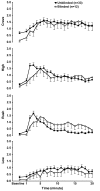Effects of perceived cocaine availability on subjective and objective responses to the drug
- PMID: 17931408
- PMCID: PMC2173892
- DOI: 10.1186/1747-597X-2-30
Effects of perceived cocaine availability on subjective and objective responses to the drug
Abstract
Rationale: Several lines of evidence suggest that cocaine expectancy and craving are two related phenomena. The present study assessed this potential link by contrasting reactions to varying degrees of the drug's perceived availability.
Method: Non-treatment seeking individuals with cocaine dependence were administered an intravenous bolus of cocaine (0.2 mg/kg) under 100% ('unblinded'; N = 33) and 33% ('blinded'; N = 12) probability conditions for the delivery of drug. Subjective ratings of craving, high, rush and low along with heart rate and blood pressure measurements were collected at baseline and every minute for 20 minutes following the infusions.
Results: Compared to the 'blinded' subjects, their 'unblinded' counterparts had similar craving scores on a multidimensional assessment several hours before the infusion, but reported higher craving levels on a more proximal evaluation, immediately prior to the receipt of cocaine. Furthermore, the 'unblinded' subjects displayed a more rapid onset of high and rush cocaine responses along with significantly higher cocaine-induced heart rate elevations.
Conclusion: These results support the hypothesis that cocaine expectancy modulates subjective and objective responses to the drug. Provided the important public health policy implications of heavy cocaine use, health policy makers and clinicians alike may favor cocaine craving assessments performed in the settings with access to the drug rather than in more neutral environments as a more meaningful marker of disease staging and assignment to the proper level of care.
Figures


Similar articles
-
The effects of subanesthetic ketamine infusions on motivation to quit and cue-induced craving in cocaine-dependent research volunteers.Biol Psychiatry. 2014 Jul 1;76(1):40-6. doi: 10.1016/j.biopsych.2013.08.009. Epub 2013 Sep 12. Biol Psychiatry. 2014. PMID: 24035344 Free PMC article. Clinical Trial.
-
Frequency of recent cocaine and alcohol use affects drug craving and associated responses to stress and drug-related cues.Psychoneuroendocrinology. 2005 Oct;30(9):880-91. doi: 10.1016/j.psyneuen.2005.05.002. Psychoneuroendocrinology. 2005. PMID: 15975729 Clinical Trial.
-
Neurophysiological effects of modafinil on cue-exposure in cocaine dependence: a randomized placebo-controlled cross-over study using pharmacological fMRI.Addict Behav. 2013 Feb;38(2):1509-1517. doi: 10.1016/j.addbeh.2012.04.006. Epub 2012 Apr 24. Addict Behav. 2013. PMID: 22591950 Clinical Trial.
-
Neural activity related to drug craving in cocaine addiction.Arch Gen Psychiatry. 2001 Apr;58(4):334-41. doi: 10.1001/archpsyc.58.4.334. Arch Gen Psychiatry. 2001. PMID: 11296093
-
Acute cortisol administration triggers craving in individuals with cocaine dependence.Psychopharmacol Bull. 2003 Summer;37(3):84-9. Psychopharmacol Bull. 2003. PMID: 14608241 Clinical Trial.
Cited by
-
Detecting cocaine use? The autobiographical implicit association test (aIAT) produces false positives in a real-world setting.Subst Abuse Treat Prev Policy. 2013 Jun 14;8:22. doi: 10.1186/1747-597X-8-22. Subst Abuse Treat Prev Policy. 2013. PMID: 23767665 Free PMC article.
-
Pain and suicidality: insights from reward and addiction neuroscience.Prog Neurobiol. 2013 Oct;109:1-27. doi: 10.1016/j.pneurobio.2013.06.003. Epub 2013 Jul 1. Prog Neurobiol. 2013. PMID: 23827972 Free PMC article. Review.
-
Yohimbine-induced amygdala activation in pathological gamblers: a pilot study.PLoS One. 2012;7(2):e31118. doi: 10.1371/journal.pone.0031118. Epub 2012 Feb 2. PLoS One. 2012. PMID: 22319607 Free PMC article.
-
Expectation to receive methylphenidate enhances subjective arousal but not cognitive performance.Exp Clin Psychopharmacol. 2011 Dec;19(6):433-44. doi: 10.1037/a0025252. Epub 2011 Aug 29. Exp Clin Psychopharmacol. 2011. PMID: 21875224 Free PMC article. Clinical Trial.
-
Drug withdrawal conceptualized as a stressor.Behav Pharmacol. 2014 Sep;25(5-6):473-92. doi: 10.1097/FBP.0000000000000080. Behav Pharmacol. 2014. PMID: 25083570 Free PMC article. Review.
References
-
- SAMHSA Results from the 2005 National Survey on Drug Use and Health (Office of Applied Studies) NSDUH Series H-30, DHHS Publication No SMA 06-4194. http://oas.samhsa.gov/NSDUH/2k5NSDUH/2k5results.htm#Ch2
-
- CEWG . Epidemiological Trends in Drug Abuse. Vol. 2006. Bethesda , National Institutes of Health, Division of Epidemiology, Services and Prevention Research, National Institute on Drug Abuse; 2006. Epidemiological Trends in Drug Abuse: Advance Report; pp. 21–24.
-
- Kreek MJ. NIDA Res Monogr. Vol. 175. National Institute on Drug Abuse; 1998. Goals and rationale for pharmacotherapeutic approach in treating cocaine dependence: insights from basic clinical research; pp. 5–35. - PubMed
Publication types
MeSH terms
Grants and funding
LinkOut - more resources
Full Text Sources
Medical

